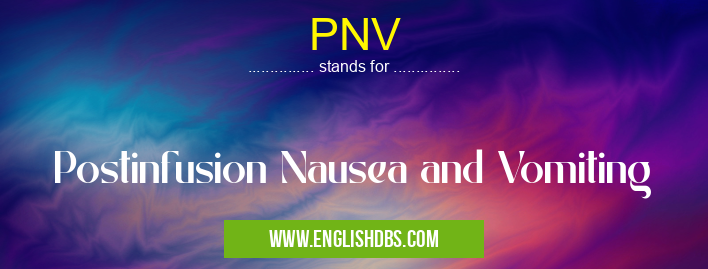What does PNV mean in UNCLASSIFIED
Postinfusion Nausea and Vomiting (PNV) is a common side effect experienced by patients undergoing intravenous (IV) therapy. It refers to the onset of nausea and vomiting within 24 hours after the completion of an IV infusion.

PNV meaning in Unclassified in Miscellaneous
PNV mostly used in an acronym Unclassified in Category Miscellaneous that means Postinfusion Nausea and Vomiting
Shorthand: PNV,
Full Form: Postinfusion Nausea and Vomiting
For more information of "Postinfusion Nausea and Vomiting", see the section below.
Causes of PNV
PNV can be caused by various factors, including:
- Drug-related factors: Certain medications, such as chemotherapy agents, antibiotics, and opioids, are known to induce nausea and vomiting.
- Patient-related factors: Patients with a history of motion sickness, anxiety, or gastrointestinal disorders are more prone to PNV.
- Infusion-related factors: Rapid infusion rates, large infusion volumes, and the presence of osmolar agents in the IV solution can contribute to PNV.
Symptoms of PNV
PNV typically manifests as:
- Nausea
- Vomiting
- Abdominal discomfort
- Headache
- Dizziness
Prevention and Management of PNV
Several measures can be taken to prevent or manage PNV:
- Premedication: Anti-nausea medications can be administered prior to IV therapy to reduce the risk of PNV.
- Slow infusion rates: Infusing IV solutions at a slower rate can help prevent gastrointestinal upset.
- Anti-emetics: If PNV occurs, anti-emetics can be used to control nausea and vomiting.
- Hydration: Maintaining adequate hydration can help alleviate symptoms of PNV.
- Non-pharmacological interventions: Relaxation techniques, such as deep breathing and meditation, can help reduce anxiety and improve symptoms of PNV.
Essential Questions and Answers on Postinfusion Nausea and Vomiting in "MISCELLANEOUS»UNFILED"
What is Postinfusion Nausea and Vomiting (PNV)?
PNV is a common side effect of receiving intravenous (IV) chemotherapy or other medications. It involves nausea and vomiting that occurs within 24 hours after the infusion.
What causes PNV?
The exact cause of PNV is not fully understood, but it is thought to be related to the release of certain chemicals in the body during or after the infusion. These chemicals can affect the brain's vomiting center, triggering nausea and vomiting.
Who is at risk for developing PNV?
Certain factors increase the risk of developing PNV, including:
- Certain chemotherapy drugs, such as cisplatin and doxorubicin
- Receiving high doses of medication
- Having a history of motion sickness or nausea
- Being female
- Having anxiety or depression
How is PNV treated?
There are several medications available to prevent or treat PNV, including:
- Anti-nausea medications, such as ondansetron or granisetron
- Steroids, such as dexamethasone
- Benzodiazepines, such as lorazepam
Can PNV be prevented?
While PNV cannot always be prevented, there are some measures that can help reduce the risk:
- Ask your healthcare provider about medications to prevent PNV
- Drink plenty of fluids before and after the infusion
- Eat light meals and avoid fatty or spicy foods
- Avoid caffeine and alcohol before and after the infusion
- Consider relaxation techniques, such as deep breathing or meditation
When should I seek medical attention for PNV?
If you experience severe or persistent nausea and vomiting after an infusion, seek medical attention promptly. This could be a sign of dehydration or other complications.
Final Words: PNV is a common side effect of IV therapy that can be both distressing and disruptive to patient well-being. Understanding the causes and implementing preventive and management strategies can help mitigate the risk and severity of PNV, ensuring a more comfortable and effective IV experience.
